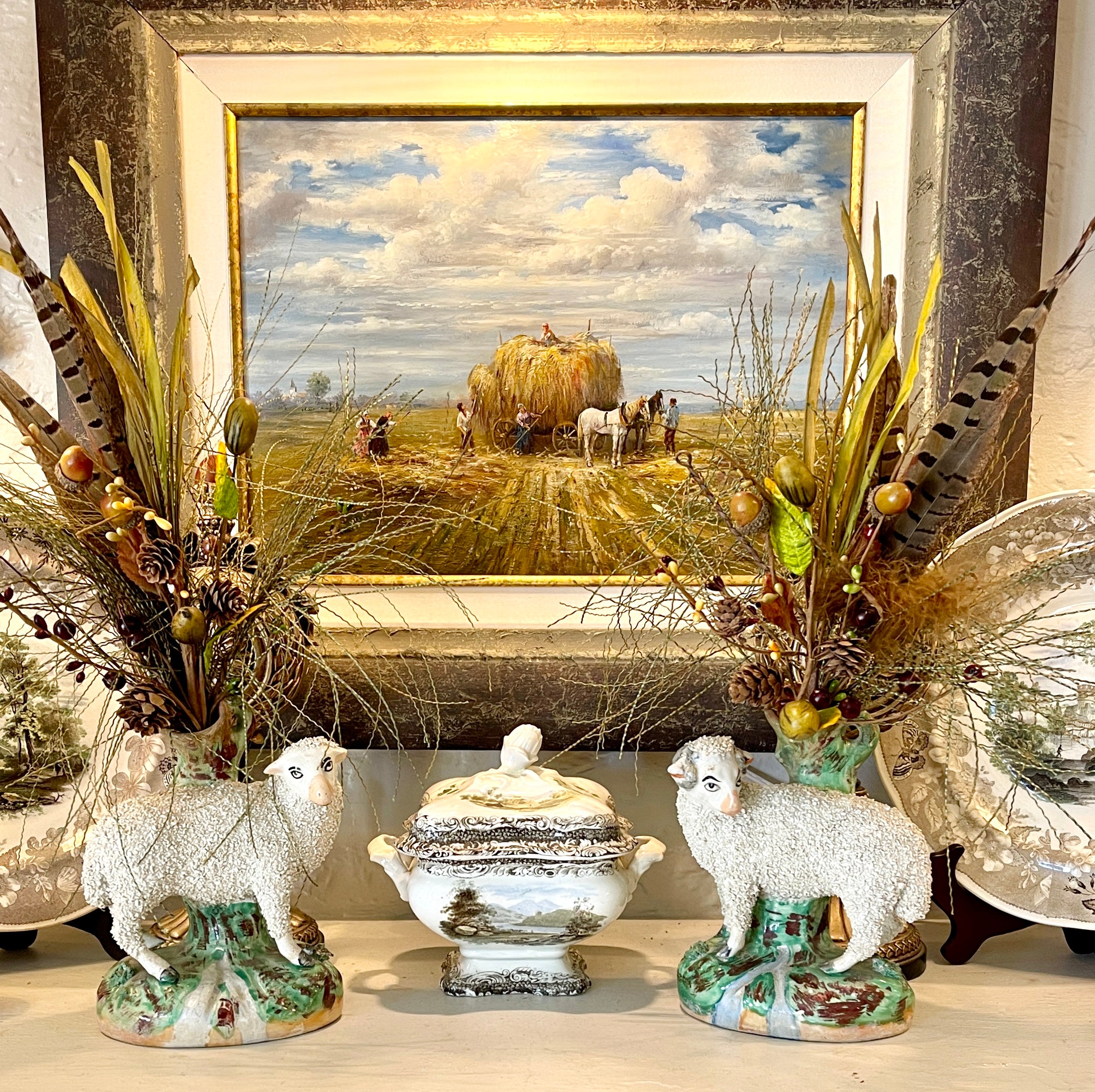STUNNING & VERY RARE Lg 16" William Smith & Co ' WEDGeWOOD ' Fruit Basket Faux Bois Light Blue Polychrome Transferware Platter
$424.99
Brand William Smith & Co
This product is unavailable
William Smith of Stockton on Tees, Yorkshire England 1825-55
VERY RARE and one of the MOST BEAUTIFUL platters ever!
Fruit Basket Plate marked WEDGeWOOD ( note the misspelling)!
Circa 1839
Condition: No chips or cracks. Some clay pops and rough spots / glaze flakes around the rim
Measures: appx 15.5"
Marked on back: both stamped and impressed
Backstamp: Fruit Basket W S & Co
Impressed: 39 W. S. & Co's Wedgewood
This is an absolutely gorgeous and beautifully detailed multi colored transferware platter with an incredibly detailed basket of fruit with a butterfly hovering above and an ornate, blue floral and faux bois border. I was so excited to find several pieces in this pattern as it is so hard to find and I've only seen plates previously. I will be offering several serving pieces including a massive soup tureen with a ladle. This is the largest of the three platters shown in the photo. They are so beautiful!
William Smith, a builder, founded the Stafford pottery situated between Thornaby road and the river in 1825 with a clay pit in close proximity for the manufacture of brown ware. However shortly afterwards he decided to branch out into making the more saleable white ware by importing the specialist clay from the West country. Then he went headhunting in Stoke on Trent and engaged, and ultimately took into partnership Mr John Whalley, a potter of considerable skill to carry out the work. Smith called his works "Stafford Pottery" (after Staffordshire- the county where Stoke-on-Trent is situated). By late 1826 William Smith & Company were selling more white ware than brown ware and as a consequence the brown ware pottery on the same site was let to other interested parties. Smith stamped and / or impressed his wares with the names Wedgewood (Wedgwood has no E), Vedgwood, etc. to imitate if not fool buyers into thinking they were buying real Wedgwood. It was not that Smith's wares were a lesser quality or of less beauty but because Wedgwood was a famous potter and name in the 1800's as well. Wedgwood took out an injunction against Smith forcing them to abandon all use of any Wedgwood spellings beginning in 1848, correct or not.
via The Potteries, the following is an extract from the 1865 book "The life of Josiah Wedgwood" by L. Jewitt:-
|
Injunction against Messrs. Smith and Co. "And now, while speaking of marks, a few words may opportunely be introduced on a matter which is somewhat puzzling to collectors, and about which they will doubtless be glad to receive enlightenment. It is this: in many collections pieces of one kind or other will be found bearing the mark WEDGWOOD & Co., and others with the mark of WEDGEWOOD, sometimes impressed, and sometimes in colour. The latter, it will be observed, has a central E, which the real name of Wedgwood does not possess. These I have heard variously appropriated by collectors to Wedgwood and Bentley, to Wedgwood and Byerley, and to a dozen other supposed periods and people. I am enabled to state that these pieces, many of them highly creditable and excellent productions, were not made by the Etruria Wedgwoods at all, but that the latter (the "Wedgewood," and sometimes the "Wedg-wood ") were the manufacture of Messrs. William Smith, and others, of Stockton, against whom Messrs. Wedgwood applied for and obtained an injunction restraining them from using the name of "Wedgwood, or " Wedgewood." The following official notification will well explain this matter, and prove of considerable interest to collectors: –
"Mr. BETHELL on behalf of the Plaintiffs, Francis Wedgwood and Robert Brown (who carry on the business of Potters, at Etruria, in the Staffordshire Potteries, under the Firm of 'Josiah Wedgwood
Mr. J. Parker said he appeared for the Defendants, and consented without prejudice; and on his application for time to answer the Plaintiffs' Affidavits, the Court made an order accordingly.
|


















